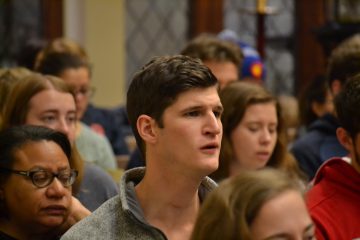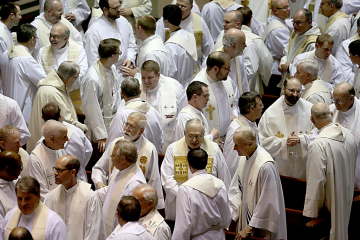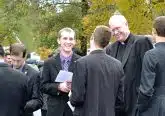Exorcists: 9 practices to avoid when fighting the devil
ACI Prensa Staff, Jan 12, 2025 / 07:00 am
The International Association of Exorcists has expressed concern over several erroneous practices, including those carried out by some priests, which confuse the faithful who seek help when possibly facing extraordinary actions of the devil.
The association, which has some 900 exorcist members worldwide, issued its warning in a Jan. 6 article on the organization’s website in order to “offer necessary clarifications to be able to act well in providing divine mercy through the ministry of exorcism.”
The association published the article because “some pastoral practices have been noticed that, instead of rendering a service to the wounded body of Christ, increase its suffering and cause disorientation.” The exorcists ask Catholics to take these observations into account “to avoid attitudes and methods that do not correspond to the authentic work of the Lord Christ.”
The text also points out that in recent years the number of those seeking out exorcists has increased due to people wondering or being convinced that they are “victims of an extraordinary action of the devil,” whether it be vexation, obsession, possession, or infestation.
However, the exorcists warn that there are cases in which this belief — which requires confirmation with a rigorous examination — is often held “by people who, without any specific training in the matter and without a mandate from the competent ordinary, act inappropriately, causing confusion among the people of God.”
The International Association of Exorcists thus warns about the following nine erroneous pastoral practices that disorient people who seek to be freed from the extraordinary action of the evil one.
1. Improvisation and sensationalism
The association begins by criticizing the attitude of some priests, consecrated persons, and laypeople who, without adequate training and without an episcopal mandate, “instead of referring cases of possible extraordinary action by the evil one” to an exorcist, employ “arbitrary methods of liberation” that are not authorized by the bishop.
“Even more serious is when they dissuade the faithful from turning to the official exorcist of their diocese, suggesting that they look for other notable exorcists considered ‘more powerful’ or [claiming] alleged extraordinary demonic activity that they have detected.”
2. Focusing on the work of the devil and not on the Gospel
The association points out that “it is deplorable that some, instead of announcing the Gospel of Jesus Christ that frees man from the slavery of evil and sin, focus their attention exclusively on the presence and work of the devil,” making those seeking help believe that “liberation depends solely on a compulsive repetition of prayers and blessings,” when the peace of Christ “can only be obtained through a life of charity, nourished by the word of God, through prayer, through frequenting the sacraments of the Eucharist and confession, and through an authentic devotion to the Immaculate Virgin.”
3. Negligent discernment
The association laments that some priests, including exorcists, neglect “the serious and rigorous discernment prescribed by the Praenotanda (directives) of the Rite of Exorcisms” and use “criteria foreign to the Catholic faith, validating concepts of esoteric or New Age origin.” The article warns that this is an approach that is “unacceptable and contrary to the faith and doctrine of the Church.”
4. Superstitious practices
The association also criticizes those who use superstitious procedures, such as requesting “photographs or clothing to identify possible evils,” as well as touching “certain points of the body of the member of the faithful to ‘diagnose the presence of malignant entities’ or to ‘expel negativity,’” or suggesting an improper use of sacramentals such as water, salt, or blessed oil “that some call ‘exorcised.’”
The article warns that “these are incorrect attitudes that feed a superstitious mentality and practice, are injurious to the dignity of the body, the temple of the Holy Spirit, and give rise to a magical use of blessed objects.”
5. The involvement of inappropriate persons
The article states that “it is unacceptable that some priests or pastoral workers collaborate with so-called ‘psychics’ or supposed charismatics” by sending to them the suffering person instead of putting them in contact with exorcists appointed by the bishops.
“Even worse, when it is the diocesan exorcist himself who delegates to these figures the task that the Church has entrusted to him, i.e., the authorized discernment of genuine extraordinary demonic activity.”
The association reminds that the exorcist must take responsibility for the suffering of others and “not omit taking the time for personal discernment … to verify the possible extraordinary action of the devil” and thus provide pastoral care for his victims.
6. Excluding medical and psychological sciences
The association explains that the exorcist not only follows traditional criteria to determine whether a person is suffering from an extraordinary action of the devil but also relies on the experience of established exorcists and, in some cases, “on the advice of people who are experts in medicine and psychiatry.”
The exorcists thus emphasize that one cannot “exclude a priori consulting the psychological and psychiatric sciences, and of other positive disciplines, which in some cases can help to understand the origin of ills that are not necessarily of preternatural origin.”
“This attitude is not only misleading, but it exposes people to unnecessary risks, ignoring the sometimes decisive contribution of modern medical and psychological disciplines.”
7. Reckless and harmful statements
The association calls on people to not fall into “the anxious desire to identify at all costs an extraordinary demonic action as the operative cause of [someone’s] suffering,” especially without having previously made a serious discernment.
8. Regarding witchcraft
In its article, the association notes that although the practice of witchcraft has become widespread, one must not fall into “the fearful attitude” of seeing in it the origin of all the evils and misfortunes that can befall a person.
The exorcists point out that “common sense and experience also teach that when an evil could have really been caused by witchcraft, concentrating on its identification” and assuring people that they have been victims is useless and irrelevant for their liberation, as well as harmful, since they may begin to pour out “feelings of hatred” toward the presumed authors of the curse.
On the contrary, it is important to focus the person’s attention “on the remedies of grace offered by the Church and on the Christian path to follow,” teaching the certainty that “God does not abandon his creature who is going through a trial but in some way suffers with him and at the same time supports and consoles him with his grace.”
Likewise, teaching “the conviction that all suffering, caused by any evil that may strike us in life, if accepted with love and offering to God, turns evil into good.”
9. Intergenerational healing (healing the family tree)
The association also warns about the error of so-called “intergenerational healing” and laments that “some priests and even some exorcists” carry out this practice “as a ‘sine qua non’ (absolutely necessary) condition, without which there can be no healing or liberation, without realizing the harm to their faith and to that of people, as well as the consequences that the latter may suffer on an existential level.”
“Several local ordinaries and bishops’ conferences have already intervened in this area, giving doctrinal reasons that demonstrate how this practice has no biblical and theological foundations.” The association gives as an example the recent doctrinal note on the subject of the Spanish Bishops’ Conference.
Banishing fear
Apart from the above practices, the association’s article also reminds readers that exorcists are called to let Christ’s peace dwell in them, rejecting all forms of fear because “whatever the reason that provokes it, when it is cultivated it leads to the weakening of faith and the loss of trust in God.”
The devil uses fear “to reduce man to slavery”; therefore, a priest who feared the devil “in the exercise of his ministry or in his daily life could not exercise the ministry of exorcism without exposing himself to serious dangers for his spiritual life, especially if instead of cultivating trust and total abandonment of oneself in the merciful hands of God, he sought to address it with more or less superstitious practices.”
“In the Bible, God’s invitation to not be afraid resounds at least 365 times,” the association notes.
Exorcism is an experience of God and of joy
The article points out that certain films have contributed to creating “a dark, disturbing, and terrifying idea of the sacramental of exorcism” as well as feeding “a morbid curiosity about the supernatural.”
However, the association assures that experience shows that this ministry “is imbued with profound joy,” since its members are witnesses of “the powerful action of the risen Christ” and the intercession of the Immaculate Virgin, of the saints and blessed, and of the angels who are “faithful servants of the Most High.”
“The main task of every exorcist will therefore be to give peace and hope, avoiding any gesture or behavior that causes confusion and fuels fear, following the invitation of the Apostle Paul: ‘Be imitators of me, as I am of Christ,’” the International Association of Exorcists notes.
This story was first published by ACI Prensa, CNA’s Spanish-language news partner. It has been translated and adapted by CNA.



![The night is advanced, the day is at hand. Let us then throw off the works of darkness [and] put on the armor of light Romans 13:12 Rorate Mass Old St Mary (CT Photo/Greg Hartman)](https://www.thecatholictelegraph.com/wp-content/uploads/2018/12/DSC_0569a-360x240.jpg)









